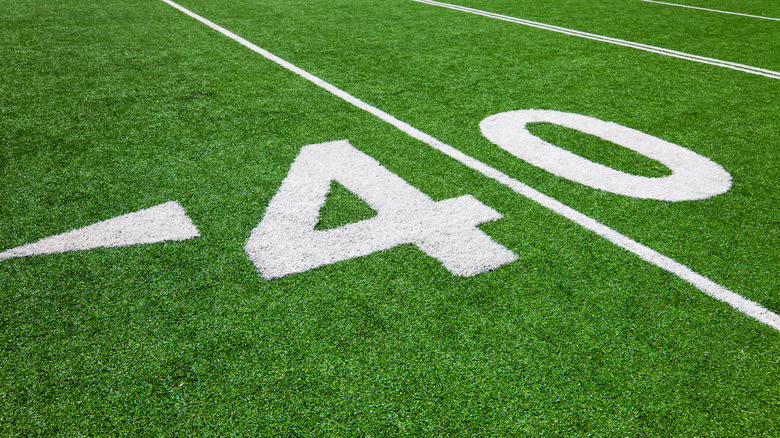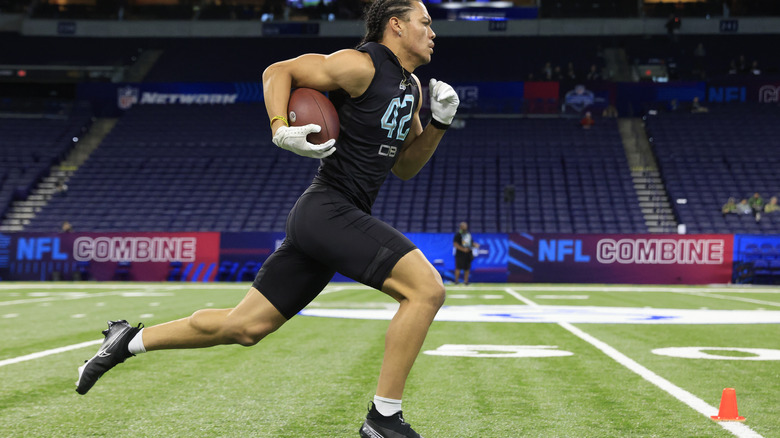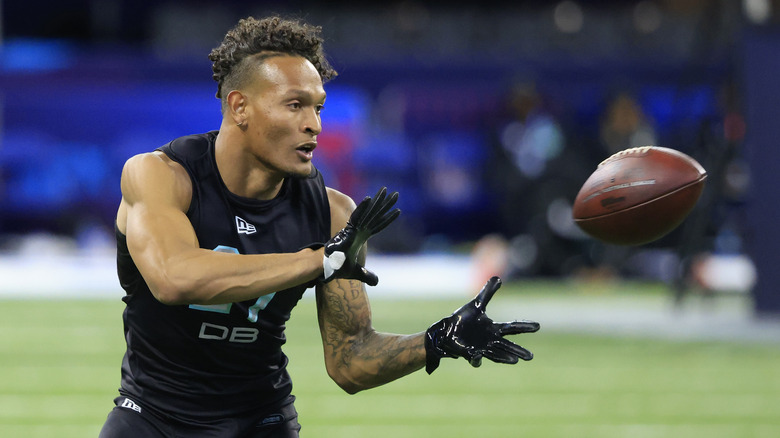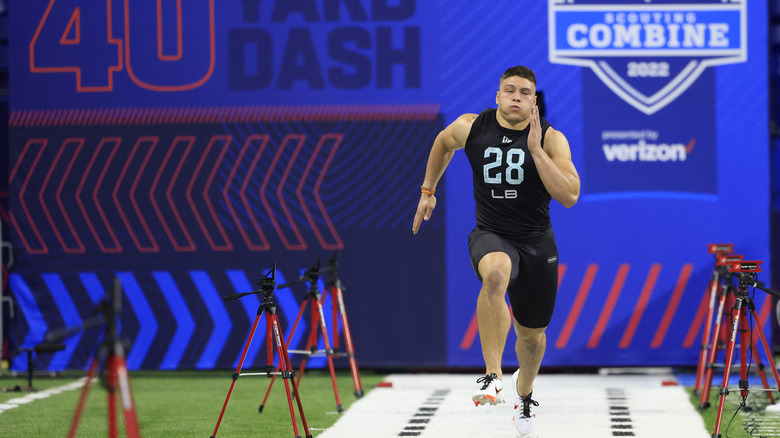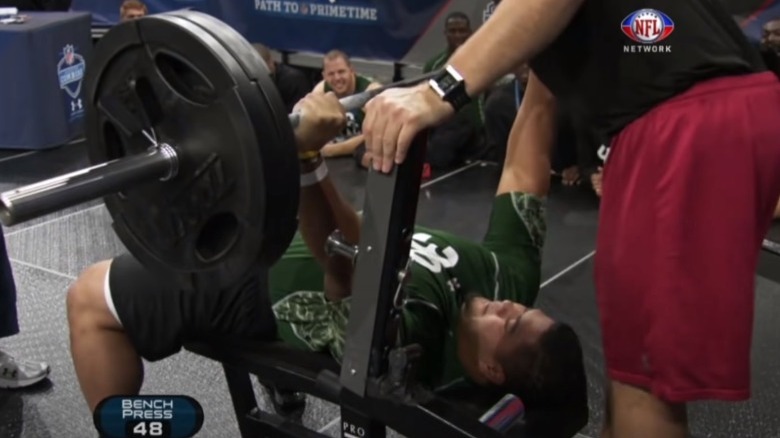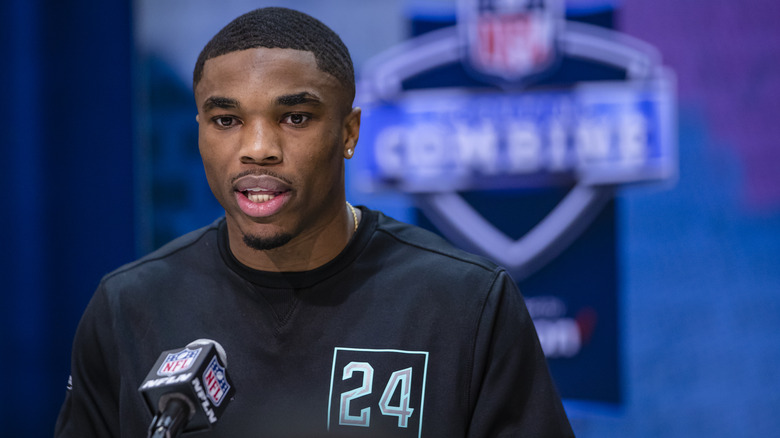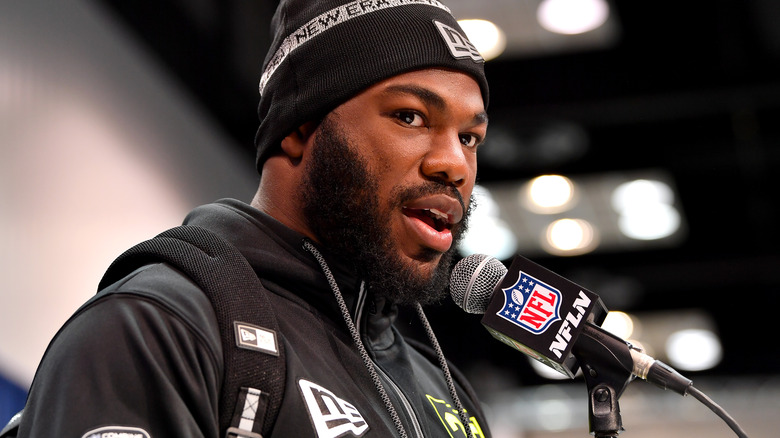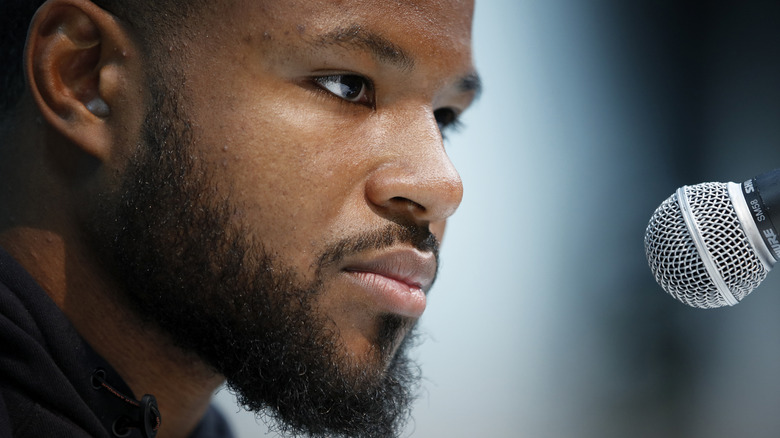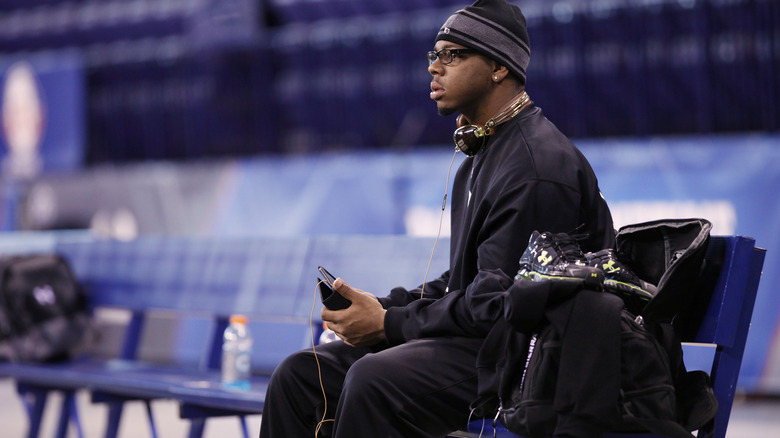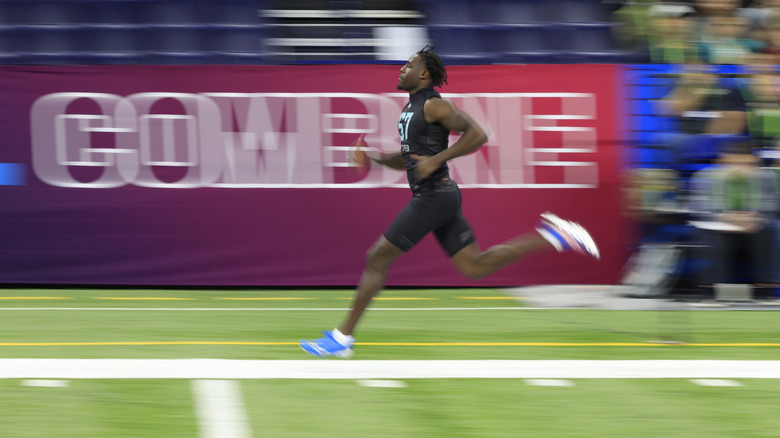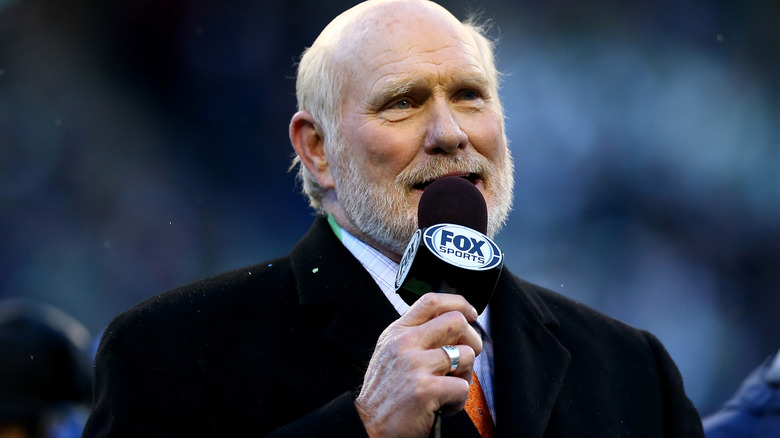Why You Wouldn't Survive The NFL Combine
Everyone knows that person: the fantasy-football-loving, Monday morning quarterback who proclaims loudly that they could, in fact, do a much better job than the guys who are actually hired to play professional football. Did you see that play? How could they have messed that one up, for the obscene amount of money they're making? Clearly, this would have been a more effective...
And so on, and so on. But here's the thing: No matter how loud that person proclaims their superiority from the comfort of their armchair, the simple fact is that not only would they not actually make it in the NFL, they wouldn't even make it into the NFL Scouting Combine.
The Scouting Combine — which is more properly called the National Invitational Camp — has gone through a few different incarnations over the years. While it seems odd that competing teams would get together to scout players they're looking to draft, there's a very practical reason for it: It allows teams to spread out the cost of the rigorous medical testing draft candidates are put through. And that medical exam is just one reason Joe "Monday Morning Quarterback" Shmoe wouldn't make the cut.
It's only open to the best of the best
The NFL's annual Scouting Combine gives delegations from all professional football teams the chance to see in-person performances from some of the brightest up-and-coming talent. It's only open to the best of the best, and among the almost countless hopefuls, it's only a relatively small number who will be invited. In 2022, there were more than 11,000 college students playing football in the NCAA's Football Bowl Subdivision. But when it came time to send out invitations to the Scouting Combine, there were only 324.
It's a tough process, and it only starts when a person has met the criteria to be eligible for the NFL draft. That means they're either a college senior or an underclassman who has declared for the draft. Sometimes eligibility can be granted to players who don't meet either of those two requirements, but that's a whole other thing — and according to NBC Sports, that's just the start.
Players who haven't already caught the attention of at least a few NFL teams aren't going to get an invitation, because those invitations are sent out under the oversight of a Player Selection Committee. That committee is made up of NFL scouts and representatives from various teams and scouting services, and those people vote on the players' names that get submitted for consideration. Get enough votes and you're in, but otherwise? Sorry, Charlie.
The schedule is grueling
Geoff Schwartz knows just how hardcore the Combine is, because he's been there. He was a seventh round draft pick for Carolina in 2008, and he's written about what it's like going through the Combine. In short? It's designed not only to showcase talent, but also to be the sort of stress test that will break anyone who's not ready for the grueling challenges of professional sports.
Schwartz says (via SB Nation) that the most important part of the four-day Combine is mental. Representatives from professional teams are looking at how players deal with stress and how they interact with their fellow athletes. He notes that it's not a coincidence that every player is given kit with their name on it: "You're easily identifiable, and everyone is paying attention to all of your movements," he explains.
Those four days are scheduled to break someone who's not mentally capable of handling pressure, and day one starts with medical testing and interviews. The second day is filled with measurement-taking (which, Schwartz adds, is done in front of hundreds of people while mostly naked), more medical evaluations, and more interviews. On the third day, it's on to psych evaluations, workouts, still more interviews, and media sessions, along with the bench press test. The on-field workouts don't happen until the end, and that's by design, too. By the fourth day, everyone's exhausted, and it's under those conditions that they're expected to get out and perform on the field. Yikes.
Even top-tier athletes are skipping some of the scheduled tests
It's no secret that competing even at a collegiate level takes a ton of hard work, and for those who have their sights set on going pro, it's even more hardcore. And that's what makes it an eye-opener to learn that some of these NFL hopefuls are skipping scheduled events at the Scouting Combine because it's just too much.
The first time the Combine was televised was in 2004, and coverage has gotten more and more extensive with each passing year. In 2022, the AP reported (via USA Today) that one of the biggest events at the Combine — the bench press — was being moved, in large part because schedules were put together with a focus on what was going to be held during prime viewing times. They also reported that only a small fraction of players opted to participate in the bench press, when previous years had seen players battle their way through injury to make sure they had a shot at setting a record. Why the difference?
When Yahoo! Sports talked to some of the players' agents, they said they were recommending giving the bench press a miss because the risk of injury was too high. One agent explained, "Too much to ask of these kids. What if you lift and then stiffen up? ... They can get hurt on the bench, and it's just not smart to make them do all this stuff the same day..."
No, you probably couldn't hack the strength test
Here's the thing about the Combine: Even a stellar performance might not be enough to get a player drafted. In 2011, defensive tackle Stephen Paea (pictured) set the official bench press record with 49 reps and went on to become a second round draft pick. But his record technically didn't beat the one set by Justin Ernest in 1999. He'd done 51 reps, but it wasn't enough to secure him a position in the draft, and the record wasn't made official.
That said, the bench press strength test is no joke, and players have to see how many reps they can do with a 225-pound weight. Let's put that in perspective.
CrossFit Shapesmiths trainer Liz Marsland spoke with Healthline about the average person's ability to bench press. Although ability varies greatly, she suggests that someone who hasn't benched before start with a 22-pound bar. She also says that how much someone can lift is generally proportional to their weight, and for a male, untrained, non-athlete who weighs about 200 pounds, the average bench press ability is about 135 pounds. In other words, 225 pounds is just out of the question without a lot of work.
Injuries aren't unheard of
Ever sneeze and throw your back out? Twist an ankle going down the stairs? Slip on some ice and end up in the emergency room? If so, you're not alone because, let's face it, the human body is fragile. Anyone who's hurt themselves doing something perfectly ordinary knows all about the red-faced embarrassment it causes, and weekend warriors should know that, given the fact that some serious athletes have been injured at the NFL Scouting Combine, ordinary people don't have a chance of making it out unscathed.
Let's look at some of them, starting with the close call Ohio State's Jeff Okudah (pictured) had in 2020. He was one of the guys to watch, and watch him, teams did — even as he made a catch and fell backward to hit his head on the turf. (He later said he was fine.) The same year, two linebackers sustained hamstring injuries while running the 40-yard dash, and a similar injury threatened to derail the experience of an Alabama running back in 2022. In 2019, another Ohio State athlete (Kendall Sheffield) suffered a torn pec during the bench press; bizarrely, it was the same injury that had sidelined fellow Ohio State alum Billy Price the year before. If these kinds of injuries hit athletes who have been training for this moment for years, someone who trips over the cat and pays for it for a month doesn't stand a chance.
Some of the questions are the sort of thing that starts fights
The NFL Combine is only partially about skill and physicality; it's also about teams getting a chance to interview players and see who's going to be a good fit. According to what former NFL lineman Geoff Schwartz wrote for SB Nation, that process is more stressful than it might seem.
"[Some] teams try breaking you," he wrote. "I had a coach who once told me his job was to make players cry in those meetings. That staff wanted to see how said player handles the pressure." Extreme? Absolutely, and for some players, the questions they get asked are nothing short of devastating — the sort of thing that, if they got asked in the parking lot after school, someone might lose some teeth.
NFL draft analyst Dane Brugler tweeted that the strangest question he heard asked at a Combine was, "Do you find your mother attractive?" Because... what? Other questions that have been asked of prospective players definitely cross every line: When Ohio State's Eli Apple sat down to talk with Breakfast on Broad in 2016, he shared (via NBC Sports), "I've been asked a lot of weird questions. I don't know if I could say on TV. The Falcons' coach, one of the coaches, was like, 'So, do you like men?' It was like the first thing he asked me. It was weird." (The Falcons later released a statement apologizing.)
It can get surprisingly emotional
Mike Tannenbaum has been on the NFL side of things at the Combine, and he's been a part of the interview process for both the Jets and the Dolphins. He wrote a piecefor ESPN on what prospects could expect to be confronted with, and said that while he had seen a lot of really weird stuff — like prospects who spoke about themselves and answered questions in the third person — he had seen and heard a lot of tear-jerking stuff, too. Bottom line? Anyone who doesn't want to share their soul need not apply.
While many of the questions are football related, they're also looking to get to know the player as a person. That means questions about family and background, which is where Tannenbaum's favorite response came from. He had asked an athlete what they would do with the bonus check they got for signing, and the response was, "I'm going to buy my grandmother groceries and fill up her kitchen, because she raised me, and we didn't have enough food growing up."
Tannenbaum said that, yes, he had seen players completely break down in tears — and that it was a good thing. For him, it confirmed how dedicated those players were, how determined they were to overcome everything that life had put in their way, and the sort of person they were under all the gear.
One of the most stressful parts is the stadium itself
Former NFL exec Phil Savage spoke to The Bleacher Report about the Combine and gave some behind-the-scenes information about things like what scouts were looking for, and how much — or how little — the results of the Combine could mean. He also touched on something surprising, and that's how the Combine's setting itself could be one of the most stressful factors, perhaps throwing an otherwise brilliant athlete off their game.
For years, players have competed on the field in front of friends, family, fans, and opponents. They've grown to thrive on the showmanship and the interaction with the crowd, the noise blending into a background cacophony that's just part of the game. Anyone who's accustomed to playing in that environment might find the Combine hard to deal with: "At the combine, it is eerily quiet inside Lucas Oil Stadium. I think sometimes the players do get caught up in the magnitude of the moment. ... You look up, you see head coaches and general managers at the 10, at the 40, with stopwatches in hand and it's so quiet... I could see how that would be a very stressful situation."
Then add in the knowledge that this is pretty much it — this is the be-all, this is the end-all, and for some, it could herald the end of something that's been the focus of a lifetime. And that? That's stress.
The in-depth medical exams have uncovered potentially deadly conditions
If the idea of a seemingly countless number of strangers poking, prodding, and getting up close and personal with you sounds awful, well, that's the medical exam of the NFL Combine. ESPN quoted one anonymous team's personnel director as summing the whole thing up like this: "I know [the players] hate it. But it's the one thing they've got to do. You know what I say when I hear all that [complaining] about taking the physical? Nothing. I just laugh, that's all."
New York Giants team doctor Scott Rodeo explains that since it's such a high-contact sport, the physical is necessary. Players move through a series of different stations that are checking for a variety of things, and those who don't have any additional tests ordered or questions to answer will take about four hours to get through the whole thing. That includes stress tests, blood work, extensive testing to determine the health and vitality of organs, and a series of X-rays that can detect everything from old injuries to potential sites for future stress fractures.
The Bleacher Report confirms that, yes, if the exam uncovers certain issues, that can spell the end of an athlete's professional career, before it ever gets off the ground. Stressful? A little bit. They also say there have been some cases where athletes have been given a devastating diagnosis: Players have been told they have malignant cancers and tumors, as well as heart conditions and illnesses such as sickle cell disease.
The (now-defunct) Wonderlic test is harder than it seems
Ever walked out of a test feeling like a complete failure? Everyone has. Welcome to the NFL Combine's Wonderlic IQ test. Although 2022 saw the NFL discontinue league-wide use of the test, it's been such a major part of the Combine for so long, it's worth taking a look at. That starts with this fun fact: According to The New York Times, the Supreme Court had already ruled that the test — which was developed in 1936 — violated the Civil Rights Act when the NFL adopted it as their go-to intelligence test. The University of Kentucky's Dr. Derrick White explains: "In the 1970s, middle linebacker, safety, center — those were all the quote-unquote 'thinking positions.' The Wonderlic, I suspect, was testing to keep Black folks out of those positions."
The Wonderlic remained a part of the Combine for decades, even though it's repeatedly been shown not to correlate with success on the field. Sports Illustrated gives the example of Terry Bradshaw, who got a pretty dismal test score but went on to be wildly successful. He famously remarked, "It's football, not rocket science."
Now that the league no longer uses the Wonderlic, it's seeking other methods for testing how quickly players will be able to pick up concepts and make snap decisions on the field. Players up for the draft are still expected to jump through hoops designed to test intelligence — in theory, at least. Their futures might rest on tests that haven't even been subjected to scientific research or peer review, and which might not actually mean a thing.
